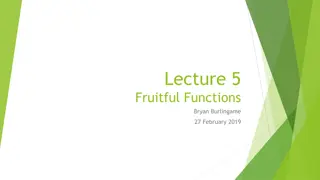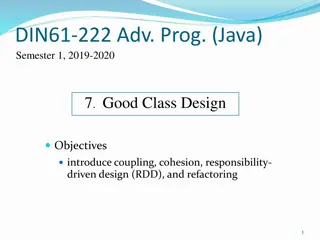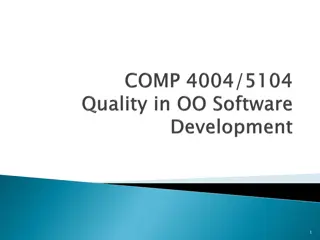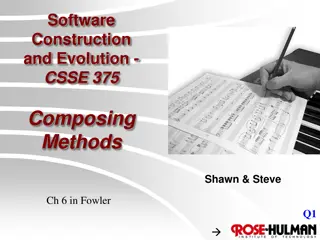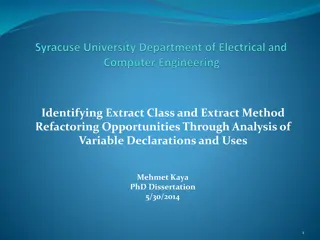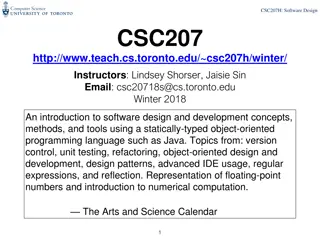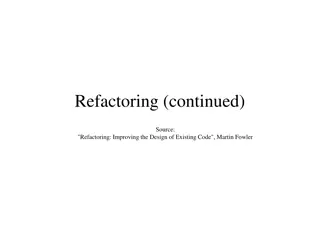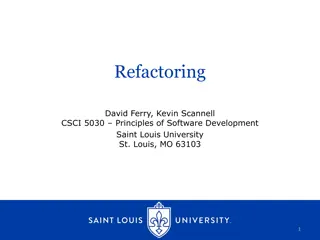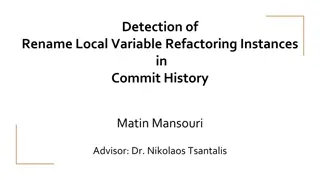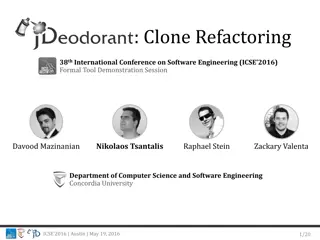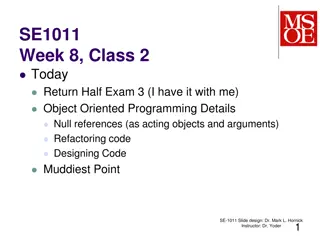Understanding Fruitful Functions in Python
Exploring the concept of fruitful functions in Python, which are functions that return a value defined by the programmer. We delve into the definition, examples, and usage of fruitful functions, along with refactoring techniques and the handling of return values in functions.
1 views • 25 slides
Exploring Class Design in Java Programming: Coupling, Cohesion, RDD, and Refactoring
Delve into the world of Java programming with a focus on class design principles such as coupling, cohesion, responsibility-driven design (RDD), and refactoring. Understand the importance of good design for code quality, ease of debugging, maintenance, and reusability. Dive into the adventure of Zuu
0 views • 39 slides
Efficient Specification Mining for Trustworthy Software Development
Explore the approach of utilizing code trustworthiness measurements to mine specifications with minimal false positives. Understand the significance of specifications in software projects and how they contribute to debugging, testing, maintenance, refactoring, and documentation. The focus is on gene
0 views • 49 slides
Understanding Software Development Processes in Java Testing
Gain insights into Test-Driven Development (TDD), refactoring, metrics, xUnit patterns, Model-Based Testing (MBT), JUnit, Cucumber, state-based MBT, and scenario testing challenges in Java. Explore requirements documentation, customer feedback, development processes, and testing methodologies. Under
0 views • 14 slides
CSSE 375: Software Construction and Evolution - Course Overview and Final Exam Preview
Delve into the world of software construction and evolution with CSSE 375. Explore topics such as software degradation, information loss due to change, and the art of avoiding pitfalls in software development. The course covers essential aspects like software change, refactoring, program understandi
0 views • 21 slides
Refactoring Methods for Composing Code in Software Construction
Explore the key concepts of refactoring methods for composing code in software development. Learn about techniques such as Extract Method and how they can improve code readability, maintainability, and reusability. Understand the process of creating well-named methods and optimizing code structure f
0 views • 23 slides
Identifying Extract Class and Extract Method Refactoring Opportunities
The dissertation discusses identifying extract class and extract method refactoring opportunities through the analysis of variable declarations and uses. It covers the impact of maintenance phases on software quality and cost, software quality aspects, bad smells in code, and software refactoring pr
0 views • 65 slides
Improving Wireless Performance Through Content Overhearing Refactoring
Explore the concept of refactoring content overhearing to enhance wireless performance by focusing on throughput, leveraging overheard packets, suppressing duplicate data, and identifying sub-packet redundancy. Benefits of this approach include operating at finer granularity, redundancy elimination
0 views • 30 slides
Multi-Label Code Smell Detection with Hybrid Model based on Deep Learning
Code smells indicate code quality problems and the need for refactoring. This paper introduces a hybrid model for multi-label code smell detection using deep learning, achieving better results on Java projects from Github. The model extracts multi-level code representation and applies deep learning
0 views • 10 slides
Ranking Refactoring Suggestions Based on Historical Volatility
Design problems in software development can be identified based on non-compliance with design principles, excessive metric values, violations of design heuristics, and lack of design patterns. By assessing the urgency to resolve these problems using past code versions, a ranking mechanism can priori
0 views • 30 slides
CSC207H Software Design Course Overview
Winter 2018's CSC207H Software Design course focuses on software design and development concepts, methods, and tools using Java. The course covers topics like version control, unit testing, refactoring, object-oriented design, design patterns, and more. Students are expected to spend 8-10 hours per
0 views • 30 slides
Understanding Refactoring Principles and Techniques
In this collection of resources sourced from "Refactoring: Improving the Design of Existing Code" by Martin Fowler, you will learn about effective refactoring methods, a catalog of refactoring examples including introducing parameter objects, recognizing when to refactor based on code "smells" such
0 views • 30 slides
Insights on Clean Code and Refactoring from Software Development Experts
Learn from renowned software development experts such as Bjarne Stroustrup, Grady Booch, Big Dave Thomas, and Michael Feathers about the importance of clean code and refactoring. They emphasize the significance of elegant, efficient, and maintainable code that enhances readability, minimizes bugs, a
0 views • 19 slides
Refactoring Instances Detection in Software Development
Refactoring is a key process in software development, involving changing the internal structure without altering external behavior. The benefits and challenges of refactoring, as well as the impact on development processes, are explored through research findings and observations from various studies
0 views • 37 slides
Enhancing Clone Refactoring Tools for Software Engineering
The formal tool demonstration session at ICSE 2016 presented insights into clone refactoring, highlighting the impacts of clones on software maintenance. The session discussed the harmful aspects of clones, such as error-proneness and increased maintenance costs, as well as the benefits, such as imp
0 views • 23 slides
Object-Oriented Programming: Class 2 Recap and Muddiest Points Discussion
Today's class delved into object-oriented programming, null references, refactoring code, and designing code. We reviewed static classes and discussed the ins and outs of using "this" and "other" in programming. The muddiest points included understanding the behavior of null objects, short-circuit o
0 views • 9 slides
Strategies for Big Refactorings in Software Development
Refactoring large portions of code can be as risky as tightrope walking without a net. However, by focusing on key areas like teasing apart inheritance, converting procedural designs to objects, and separating domain from presentation, you can navigate these challenges effectively. This guide explor
0 views • 8 slides
